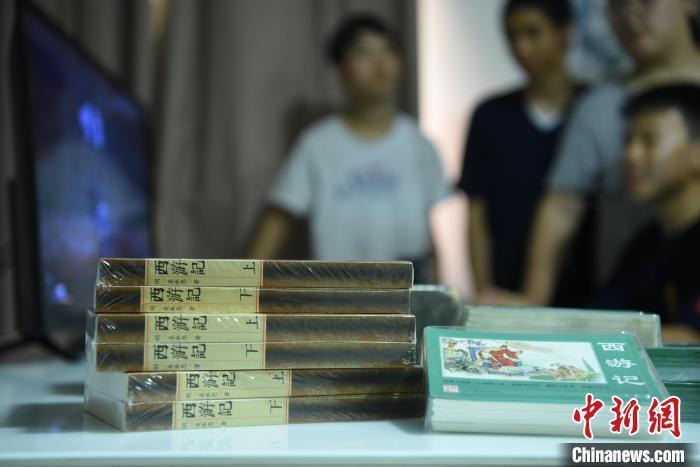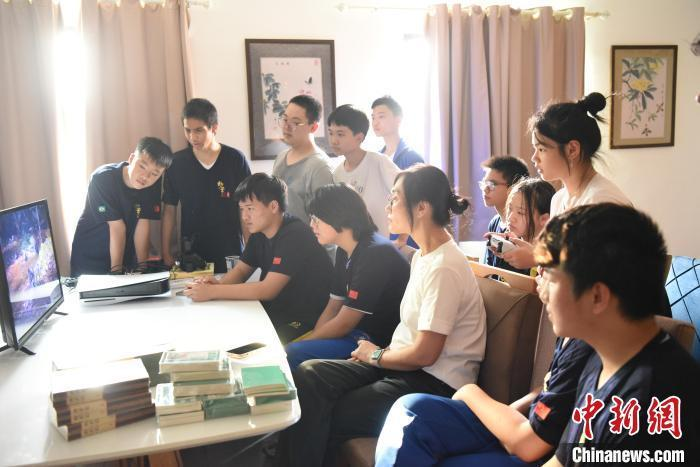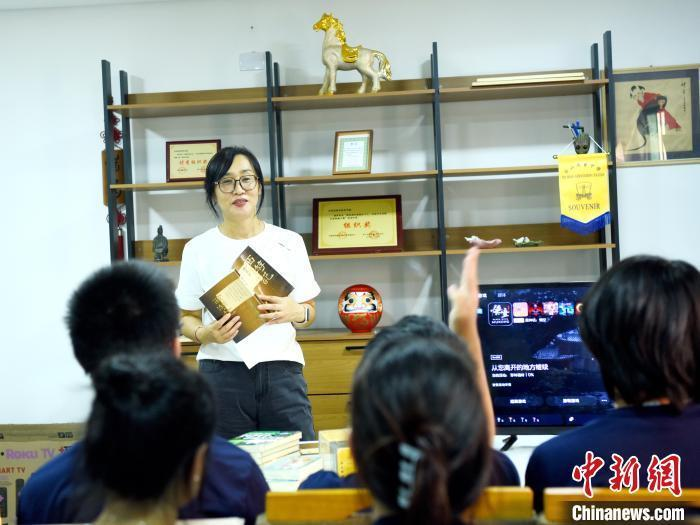
On August 23rd local time, in São Paulo, Brazil, the Youhua Bilingual School in Brazil introduced the Chinese AAA game "Black Myth: Wukong" into its classic reading class. The classroom displayed copies of the original novel and comic books of Journey to the West donated by Qingdao Xinhua Bookstore, which were warmly received by the students. Journey to the West, rich in fantasy and everyday life elements, is a cornerstone of Chinese language education. As an intercultural product, an outstanding game can foster cultural exchange by resonating with players.

"How about playing 'Black Myth: Wukong' during our classic reading class?" Zhang Yingren, a teacher at Youhua Bilingual School, posed this question in the teacher-student chat group, sparking excitement among the students.
Zhang Yuezhen, a student at the school, told reporters that the game's emergence has taken the gaming world by storm, demonstrating the global appeal of Chinese classics and culture, and filling him with immense pride.

On August 24th, Chen Ding, a teacher at the Confucius Institute at São Paulo State University, lectured on the Chinese elements in "Black Myth: Wukong" to her advanced Chinese class. She mentioned, "I've been following this game for a while; it's truly a cultural feast both in China and abroad."
"The 'Wukong' IP is widely known in China and has significant recognition overseas,” Chen Ding noted, highlighting how the game's soundtrack pays homage to "Cloud Palace Fast Music", the opening theme music of the 1986 "Journey to the West" TV series. She explained that the combination of electronic Western music with traditional Chinese instruments like the guzheng and pipa created a timeless classic, exemplifying China’s historical openness and inclusivity.

Fernando Maza, a veteran in the gaming industry and Brazil's operations director for a Chinese gaming company, shared that games with elements from the Chinese culture are very popular in Brazil, sparking interest among Brazilian gamers in "The Romance of the Three Kingdoms", "Journey to the West", and their legendary characters, as well as in the original novels.
Maza noted that reading Chinese texts is challenging, especially since historical Chinese figures often have multiple names. "I spent a long time reading before I realized that 'Mr. Wolong', 'Kongming', and 'Zhuge Liang' were all the same person," he said. "But the games' battles and sense of honor make gamers really, really love these stories."
The English version of "Black Myth: Wukong" opts for pinyin rather than literal translations, such as "Wukong" instead of "Monkey King", "Jin Gu Bang" instead of "golden staff", and "Black Bear Guai" for "Black Bear Monster".
"This use of pinyin is a significant step forward, helping Chinese vocabulary 'go global'," said Guo Xi, Director of the Overseas Chinese Language Research Center at Jinan University and a doctoral supervisor. In an interview, Guo emphasized that the Chinese language is not just a key or bridge for China-foreign communication, but a tool for understanding the Chinese-speaking world, capable of bridging cultural divides.
Source :Lingnan on the Cloud
《黑神话:悟空》成海外华文教育的“文化盛宴”
当地时间8月23日,巴西圣保罗,巴西幼华双语学校里经典阅读课堂引进中国3A游戏《黑神话:悟空》。课堂上陈列着来自青岛新华书店捐赠的《西游记》原著小说和连环画,深受学生们欢迎,《西游记》奇幻而生活气息浓郁,是华文教育的经典文本。优秀游戏作为跨文化的产品,在激发玩家共鸣的过程中,文化就交流起来了。
“在经典阅读课上玩一把《黑神话:悟空》怎么样?”巴西幼华双语学校教师张熒壬在师生交流群里抛出这个问题后,学生们欢乐得“炸了”。
幼华学校学生张躍臻告诉记者,这次游戏横空面世,风靡整个游戏界,“可见中国名著和中国文化对全世界的吸引力”,让他感觉“无比自豪”。
24日,圣保罗州立大学孔子学院教师陈鼎为中文高级四班授课,也开讲《黑神话:悟空》里的中国元素。她说:“我很早之前就关注了这个游戏,它在中国和海外都是一个文化盛宴。”
“悟空这个‘IP’,中国人家喻户晓,海外知名度也很高。”陈鼎还重点分析了游戏配乐所致敬的1986年版电视剧《西游记》片头曲《云宫迅音》,指出正是编曲用西乐的电音,小号、铜管等管弦乐和古筝、琵琶等中国民乐大胆碰撞,才塑造了经典之作,“中国文化历来开放包容”。
圣保罗资深游戏业者费尔南多·马扎是一家中国游戏公司的巴西运营总监。他告诉记者,中国“国风”游戏在巴西备受欢迎,引发了巴西玩家对《三国演义》《西游记》英雄人物乃至小说原著的兴趣。
马扎说,阅读中文文本并非容易,尤其是中国古人往往有多个名字,他曾“看了很久小说,才明白卧龙先生、孔明和诸葛亮是同一个人”。“但因为游戏的战斗力和荣誉感,让玩家非常非常喜欢这些故事。”
《黑神话:悟空》英文版中,摒弃以往的意译命名,而是采用拼音。悟空不再是“Monkey King”,直接翻译为“Wukong”;“金箍棒”亦不采用“镀金的长棍子”,而是“Jin Gu Bang”;“黑熊精”则被译为“Black Bear Guai”等等。
“这样的拼音命名,是一次大的进步,让中文的词汇‘走出去’。”正在巴西做华侨史研究的暨南大学海外华语研究中心主任、博导郭熙受访说,华文不仅是中外沟通的钥匙和桥梁,更是认识华语世界的工具,可填补中外文化鸿沟。
来源 | 中国新闻网
译 | 赵凡
英文审校 | 林佳岱
-
Poster丨The 2024 Guangdong Triathlon started in Ruyuan
2024-08-27 21:36:15 -
Video | Lingnan Water Town International Cartoon and Animation Week kicks off
2024-08-26 22:38:33 -
'Black Myth: Wukong' boosts Shanxi Tourism for National Day Holiday
2024-08-26 22:38:34 -
Photos | Guangdong's guardian of Nyingchi
2024-08-26 22:38:30






